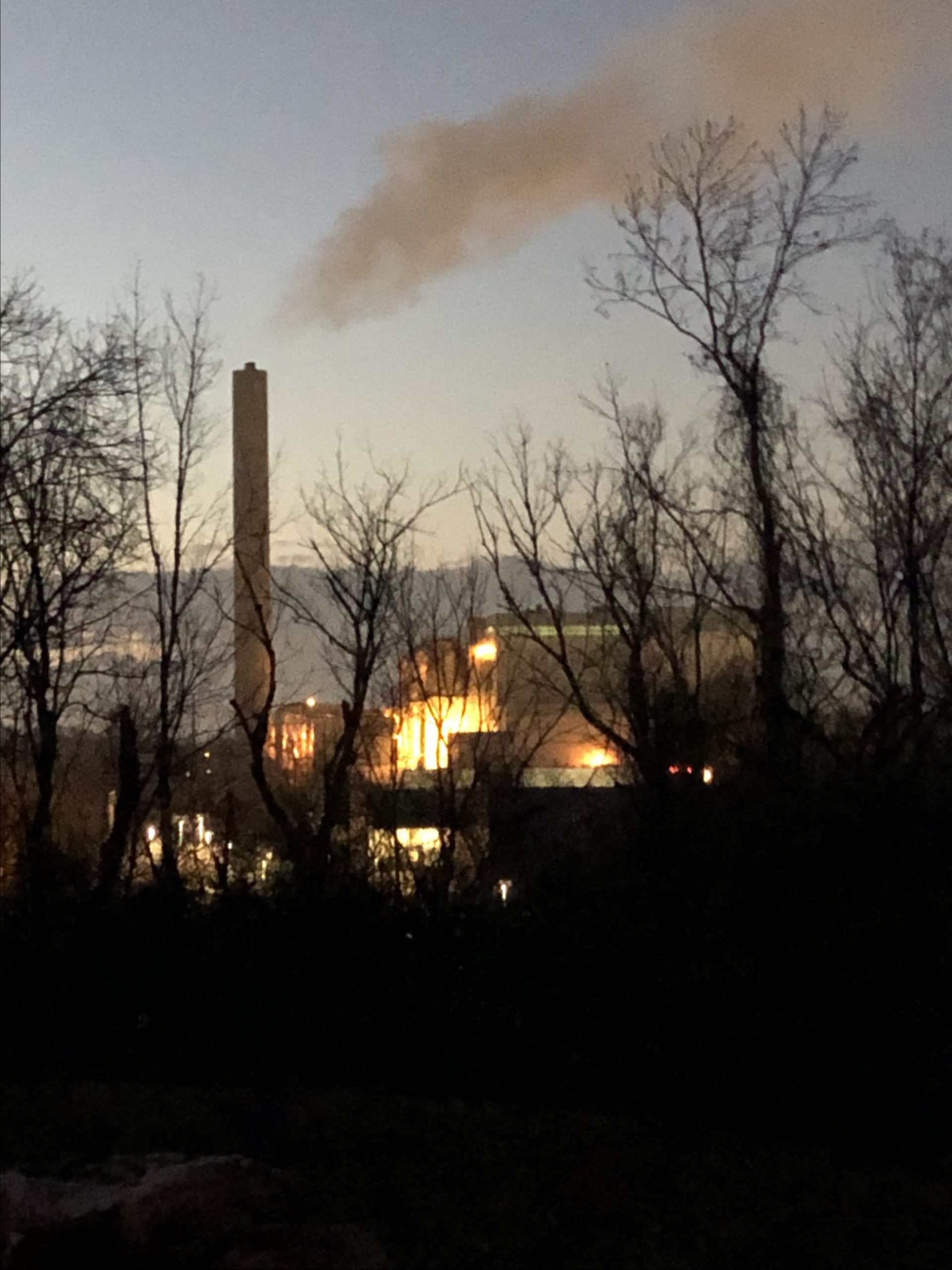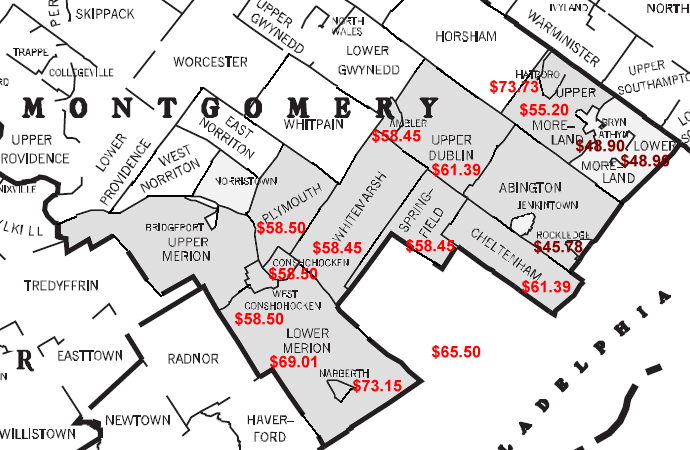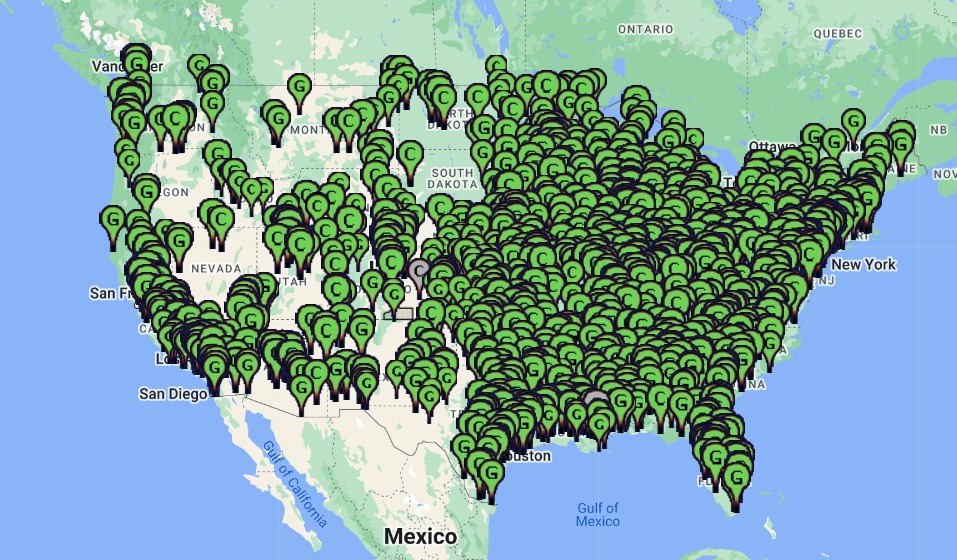to contact your local officials before they vote soon on where your trash goes!
The Covanta Plymouth trash incinerator is Montgomery County’s #1 Air Polluter

Montgomery County recently received an “F” grade from the American Lung Association for smog in their 2019 State of the Air report. The Asthma and Allergy Foundation ranked the Philadelphia metro area as the 4th worst place for asthma. This is, in part, due to the huge amounts of nitrogen oxide (NOx) air pollution released from Covanta Plymouth and other major polluters in the area. In the whole 5-county Philadelphia area, three of the four largest NOx polluters are trash incinerators: Covanta Delaware Valley (in Chester City), Covanta Plymouth, and Wheelabrator Falls in Bucks County.
Because of the air pollution and health concerns, 41 organizations, including all of the major environmental organizations, wrote to Philadelphia’s mayor asking that they not continue to contract to burn the city’s trash in Covanta Plymouth and other incinerators.
In 2017, according to data reported to the state DEP on industrial sources of air pollution:
Covanta Plymouth released:
| 421,828 | TONS of greenhouse gases (CO2 equivalents) |
| 1,320,940 | pounds of Nitrogen Oxides (NOx) |
| 114,420 | pounds of Carbon Monoxide (CO) |
| 102,800 | pounds of Hydrochloric Acid |
| 70,360 | pounds of Sulfur Oxides (SOx) |
| 16,741 | pounds of Particulate Matter (PM10) |
| 16,293 | pounds of Fine Particulate Matter (PM2.5) |
| 5,852 | pounds of Ammonia |
| 3,630 | pounds of Volatile Organic Compounds (VOCs) |
| 5.8 | pounds of Nickel |
| 4.0 | pounds of Lead |
| 3.2 | pounds of Chromium |
| 1.4 | pounds of Mercury |
| 0.4 | pounds of Arsenic |
| 0.4 | pounds of Cadmium |
To put the smaller numbers in perspective, mercury is one of the toxic pollutants for which there is no known safe level of exposure. Lead is also known not to have any “safe” level. The incinerator reported releasing 1.4 lbs of mercury into the air in 2017, not counting that which gets into the air and water via the ash. Mercury is incredibly toxic. A highly cited Minnesota study found that if approximately one gram of mercury (the amount in a single fever thermometer) is deposited to a 20-acre lake each year from the atmosphere, this small amount, over time, can contaminate the fish in that lake to the point where they should not be eaten. 1.4 pounds of mercury equals 635 grams. That means the incinerator, in a typical year, is releasing enough mercury sufficient to keep over 600 20-acre lakes so contaminated that the fish are not safe to eat.
In terms of rankings, Covanta Plymouth is the largest air polluter in Montgomery County, responsible for 36% of the county’s industrial air pollution. On specific pollutants, it’s #1 in carbon dioxide (36% of the total), hydrochloric acid (96%), nitrogen oxides (55%), and sulfur dioxides (28%). It’s #2 in mercury (16%) only because a sewage sludge incinerator in Hatfield is #1. It’s also #2 in condensable particulate matter.
What does this cost to human health? A 2017 study from the New York University School of Medicine found that just one pollutant (fine particulate matter) from the trash incinerator in Baltimore is causing $55 million in annual health costs to residents in several states including Pennsylvania. Fine particulate matter (PM2.5) is associated with premature death, heart disease, chronic bronchitis, and other respiratory distress. The PM2.5 emissions from Covanta Plymouth are 43% that of the larger Baltimore incinerator. Without factoring in the largest population in the Philly area (which would increase this number), this would translate to over $23 million in annual health damage due to just one pollutant coming out of Covanta Plymouth — and this is based on their reported 2017 emissions before they started having routine malfunctions in late 2018.
Covanta’s violations
Scroll to the bottom of these links to see their latest air, waste, and water violations issued by the PA Department of Environmental Protection.
Company-wide, Covanta is a notorious violator. See Covanta’s violations through September 2006 — a 93-page document filed by Covanta with the Pennsylvania Department of Environmental Protection, outlining their violations, company-wide. Note on page 37 where Covanta lists being busted by the state of Connecticut for tampering with their continuous emissions monitoring system to make it seem as if their emissions are lower than they really are.
See Covanta’s more recent violations (through June 2018). Covanta Plymouth’s violations are on page 37.
Similar to their Connecticut violation for tampering with their emissions monitors, Covanta was busted in more recent years at their Tulsa, Oklahoma incinerator. This is from their 10K filing with the Securities and Exchange Commission:
Tulsa Matter. In January 2016, we were informed by the United States Attorney’s Office for the Northern District of Oklahoma (“US Attorney’s Office”) that our subsidiary, Covanta Tulsa Renewable Energy LLC (“Covanta Tulsa”), was the target of a criminal investigation being conducted by the EPA. The investigation related to alleged improprieties in the recording and reporting of emissions data during an October 2013 incident involving one of the three municipal waste combustion units at our Tulsa, Oklahoma facility. In October 2018, Covanta Tulsa entered into a Non Prosecution Agreement (“NPA”) with the US Attorney’s Office, pursuant to which no charges will be filed if, for a period of one year, Covanta Tulsa satisfies the requirements of the NPA, including that it comply with applicable laws and regulations. As part of the NPA, Covanta Tulsa also made a $200,000 community service payment to the Oklahoma Department of Environmental Quality to fund air quality and environmental efforts in Oklahoma.
Where does Covanta Plymouth’s waste come from?
| Municipality | Contract is with [links to contracts] | $/ton (2019) [links to fees] | Up for Renewal | Expires | Notes |
|---|---|---|---|---|---|
| Abington Township | |||||
| Ambler Borough | Covanta 4 Recovery, L.P. | $58.45 | 12/31/2019 | 12/31/2022 | |
| Bryn Athyn Borough | Waste Management | $48.90 | 12/31/2022 | “Borough of Bryn Athyn has not signed a contract with Covanta for waste disposal. “Bryn Athyn Borough is piggybacking on the Lower Moreland contracts and intends to continue this arrangement into the next contract.” | |
| Cheltenham Township | Covanta 4Recovery, L.P. | $58.45 ($89.98 including hauling) | 12/31/2019 | See memo, fees and payments. Originally told us: “We are in a consortium contract with several townships. Upper Dublin Township coordinates the contracts with Covanta on all our behalfes” | |
| Conshohocken Borough | Covanta | $58.50 | 12/31/2019 | 12/31/2024; 12/31/2029 | In combined bid with West Conshohocken Borough and Plymouth Township. Voted on Nov. 20th to continue Covanta contract for another two years. |
| East Norriton Township | [Does not provide waste services] | Information does not exist.; “The Twp does not provide waste disposal services.” | |||
| Hatboro Borough | Covanta 4Recovery, L.P. | $70.48 – $76.97 (depending on hauling distance) | 12/31/2019 | 12/31/2022 | Borough hauls to Abington Transfer Station. See also Nov 2019 bids from Waste Management ($88/ton), Republic ($85/ton), and Mascaro ($107+/ton), Covanta’s 2014 proposal, payments, and bonding documents. |
| Horsham Township | [Does not provide waste services] | Township itself (for public buildings and such) has contract with Advanced Disposal for regular trash and Republic Services for recycling. | |||
| Jenkintown Borough | BFI Waste Services of Pennsylvania, LLC | (Flat contract price regardless of volume) | 4/1/2020 | ||
| Lower Merion Township | Covanta 4Recovery, L.P. | $69.01 | 12/31/2019 | Township payments to Covanta | |
| Lower Moreland Township | Waste Management | $48.90 | 12/31/2022 | “Lower Moreland Township does not have… a current contract with Covanta or their related companies.”; “When the former members of that waste consortium solicited bid pricing, Lower Moreland received lower tipping fee bids from Waste Management so they have been our disposal contractor since then.” | |
| Narberth Borough | Lower Merion Twp transfer station (Covanta) | $73.15 | 12/31/2019 | 12/31/2020 (and annually) | See also 2019 Q1 and Q2 payments and Covanta letter. |
| Norristown Borough | Mascaro (trash and recycling) | 3/31/2020 | 3/31/2022 | See proposal. | |
| Plymouth Township | Covanta 4Recovery (Exhibit “B” missing.) | $58.50 | 12/31/2021 | 12/31/2024; 12/31/2029 | In combined bid with Conshohocken Borough and West Conshohocken Borough. On 11/11/2019, the Township voted 3-1 to extend the Covanta contract for two years until the end of 2021. See also Agreement to hire Curtin & Heefer LLP law firm. |
| Rockledge Borough | Waste Management | $45.78 | 12/31/2022 | “When the waste consortium disbanded all of those consortiums put their waste disposal out to bid and each municipality received bids from several companies. Our waste disposal contract is currently with Waste Management and we pay $45.78/ton. We are in year 5 of a 5-year contract and have opted to stay with them for the 3 year contract extension – year 1: 46.70/ton; year 2: $47.63/ton; year 3: $48.58/ton. Waste Management was the low bidder with Covanta bidding: Year 1: $79.35/ton Year 2: $81.19/ton Year 3: $83.08/ton Year 4: $85.01/ton Year 5: $86.98/ton” | |
| Royersford Borough | Covanta Plymouth Renewable Energy LP | 12/31/2019 | See 2020 request for bids and 2014 article about current contract. | ||
| Springfield Township | Covanta 4Recovery, L.P. | $58.45 | 12/31/2019 | 12/31/2022 | See payments. |
| Upper Dublin Township | Covanta Sustainable Solutions, LLC; prior was with Covanta 4 Recovery, L.P. | $61.39 | 1/31/2020 (already extended to 2022?) | 1/31/2022 | See also fee and tonnage data, and older disposal agreement. |
| Upper Merion Township | [Does not provide waste services] | Township has a contract with Waste Management for trash and recycling at the Township’s facilities. | |||
| Upper Moreland Township | Covanta 4Recovery, L.P. | $55.20 | 12/31/2019 | 12/31/2022 | See payments. |
| West Conshohocken Borough | Covanta 4Recovery | $58.50 | 12/31/2019 | 12/31/2021; 12/31/2029 | In combined bid with Conshohocken Borough and Plymouth Township. On 11/12/2019, Borough Council voted to extend the Covanta contract for two years until the end of 2021. Additional extensions through 2029 are possible. |
| Whitemarsh Township | Delaying until 11/22, but we got the documents through an earlier requestor. | Covanta 4 Recovery, L.P. (disposal contract) & J.P. Mascaro & Sons (hauling contract) | $58.45 (Covanta); $66.48 / unit (Mascaro) | 12/31/2019 | Vote on 11/14/2019 to end relationship with Covanta and pay an extra $1/week per household to sign a new contract with Mascaro to haul to their own transfer station and landfill, avoiding incineration out of concern for public health. It’ll be $249/household for a 3-year contract with two potential 1-year extensions. |
| Whitpain Township | [Does not provide waste services] | “Whitpain allows residents to select and contract with the trash hauler that best meets their needs. The Township does not offer trash collection as a municipal service and we do not mandate that residents select a single Township-approved hauler.” |
Incineration is more expensive.
This is true generally, and is admitted by three waste industry associations.
In Eastern Montgomery County, based on the contract data supplied so far (above), the average incinerator contract in 2019 is $63.02/ton. The average landfill contract is $47.86/ton. In the map below, incinerator contracts are in darker grey with red prices. Landfills are lighter grey with brown prices. Every landfill price is under $50/ton while every incinerator price is over that.

Incinerators are worse than landfills, even for the climate
Trash incineration is the most expensive and polluting way to manage waste or to make energy. It’s dirtier than coal burning and worse than directly using landfills. The data backs up the unanimous opinion of the environmental community in opposing incineration and recognizing that it’s worse than landfills. Incineration doesn’t avoid landfilling. It puts over 70% of the waste into the air as air pollution (all that escapes air pollution controls), and the 30% that remains (including the portion caught in pollution controls) consists of toxic ash that is shipped to landfills in Chester and Berks Counties. Please see this factsheet explaining why incineration (and ash landfilling) is worse than direct use of landfills. Landfills are not good and no one is advocating for them, but we need to be honest about the fact that incineration only makes landfills more toxic, and pollutes the air far worse.
There are alternatives
Pennsylvania has plenty of landfill capacity – Pennsylvania has a glut of landfill space. With 43 landfills and six trash incinerators, Pennsylvania has too much waste disposal capacity, which is why the state has been the #1 importer of trash for the past three decades since this was first documented. Pennsylvania has been importing trash from Canada down through Puerto Rico, and every state in-between. There are 13 active landfills within two counties’ distance, with a glut of landfill capacity available. They are:
Bucks County: Fairless Landfill
Chester County: SECCRA Landfill
Northampton County: IESI PA Bethlehem Landfill, Chrin Brothers Sanitary Landfill, and Grand Central Sanitary Landfill
Berks County: Conestoga Landfill, Rolling Hills Landfill, Pioneer Crossing Landfill, Western Berks Landfill
Lancaster County: Lanchester Landfill, LCSWMA Frey Farm Landfill
Schuylkill County: Commonwealth Environmental Systems
Lebanon County: Greater Lebanon Refuse Authority Landfill
The two boldfaced landfills are where trash is trucked in the form of ash from the Covanta Plymouth incinerator.
Trucking distance is not an issue – Eastern Montgomery muncipalities don’t need to truck waste directly to these landfills in the area. Municipalities can contract with haulers to use any of the three transfer stations in the Plymouth Meeting area, and contracts can ensure that waste will not go to any incinerators, permitting only direct landfill use.
Concern about emissions from trucking to landfills does not justify burning trash closer to home. A life cycle analysis of waste disposal options for Washington, DC found that incineration is far more polluting than landfilling, even if having to truck waste five times as far to landfills 130 miles away. Trucking emissions are insignificant compared to the extreme amount of pollution emitted by incineration.
There are three companies with transfer stations in the area which don’t rely on incineration. A “landfill only” contract could be entered with any of these companies that primarily do not use incineration.
Waste Management – Norristown
310 W Washington St, Norristown, PA 19401 (3 mi)
855-389-8047
www.wm.com
Republic Services River Road Transfer Station
400 River Rd, Conshohocken, PA 19428 (4 mi)
610-275-6767
www.republicservices.com/customer-support/facilities#transfer-stations
J.P Mascaro & Son’s
DeKalb Pike, Bridgeport, PA 19405 (4 mi)
610-272-7100
www.jpmascaro.com/our-facilities/bridgeport-transfer.aspx
Waste and recycling contracts should…
It’s important that waste contracts avoid incineration and protect the municipality from unnecessary costs. New Requests for Proposals for waste collection or recycling should:
- Solicit bids from at least the three local transfer stations listed above.
- Do not allow “put or pay” clauses that have any sort of guaranteed minimum amount of waste. Because incinerators require a certain amount of waste to stay in operations (unlike landfills), their contracts often contain a minimum amount of waste that must be provided, or the municipality must pay anyway. These “put or pay” clauses in incinerator contracts have bankrupted towns and cities. Currently, Baltimore County, MD is being sued for $32 million for not providing enough trash to the Wheelabrator Baltimore incinerator. In 2015, Washington, DC signed a 5-11 year contract with Covanta that has no minimum required amount of waste. “Put or pay” clauses discourage waste reduction, recycling, and composting because the municipality is penalized by having to pay anyway if they fall below the minimum amount of waste promised. Similarly, don’t sign contracts with flat costs that are not in dollars per ton.
- Ensure that any waste facilities must follow the law. Failure to follow all federal, state, and local environmental laws and regulations should be grounds for breach of contract.
- Prohibit incineration. This should be spelled out to prohibit use of any municipal waste combustor (trash incinerator), or any refuse-derived fuel (a.k.a. SpecFuel, or Processed Engineered Fuel) that involves marketing waste or recyclables as fuel to be burned in cement kilns or other boilers. Waste Management does this at The Forge — their plant in Northeast Philly — with trash and also with the contamination and unmarketable material in recycling bins. Mascaro does this with the plastics they collect and bring to their plant in Berks County. Ideally, a contract should also avoid any experimental types of incineration (pyrolysis, gasification, plasma arc), other failed experimental processes like trash-to-biofuels schemes, which are costly and technically fail. No commercial facilities exist in the region, but companies keep trying.
- There are many ways in which municipalities can work to reduce waste and save money. These can be worked into waste and recycling contracts as well. Municipalities are encouraged to reach out to us about how to incorporate these “Zero Waste” policies that save money, promote public health and the environment, and create jobs while reducing waste. Contact Mike Ewall, Esq. at 215-436-9511 or mike at energyjustice.net.

